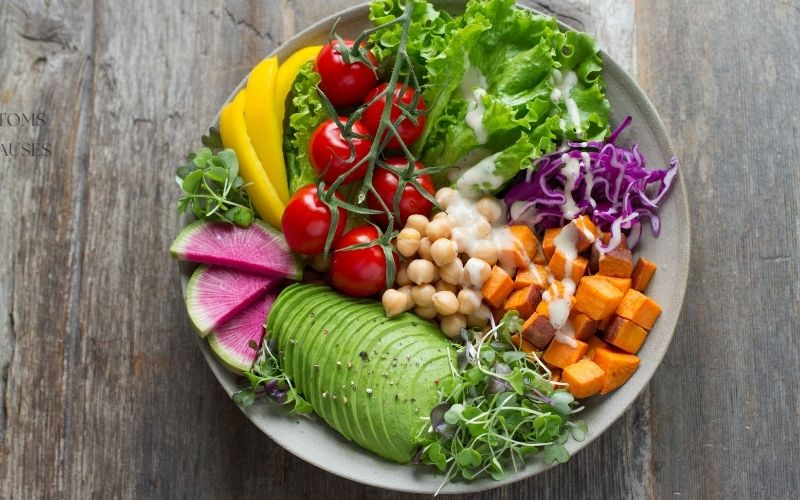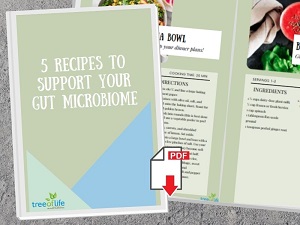
Winter is typically the time we see more viruses and bugs circulating in the community. So as our days get cooler, patients often ask us about diet and how to use it to support good immunity. And yes, what you eat can make a big difference. There is a strong link between the health of our gut microbiome and our overall immunity. So if you suffer from irritable bowel syndrome (IBS), you may wonder about the relationship between the immune system and IBS symptoms. Does IBS weaken the immune system? Or do symptoms of IBS indicate a weakened immune system? We look at the science around this more closely. We also give you some tips for improving IBS symptoms and supporting your overall gut health and therefore, your overall immune function.
The relationship between gut health and immunity
Research on gut health and the gut microbiome is increasing our understanding of the role gut flora plays in the health of the whole body. Studies show that the composition of our gut bacteria can influence different diseases. And likewise, diseases can impact the health of the microbiota.
When it comes to our immune system, the volume and diversity of beneficial bacteria have been shown to benefit our immune cell function. While experiencing gut dysbiosis or an overgrowth of bad bacteria is linked to hyper-inflammatory reactions and promotion of gastric disease.
So gastric symptoms such as irritable bowel may not only be concerning in terms of your digestive health but worth investigating to prevent more severe inflammation, disease and infection. If you’re not sure if what you’re experiencing could be irritable bowel, you may like to check out my last article, which outlines the symptoms which present with IBS.
How does IBS weaken the immune system?
The science definitely suggests that with IBS we get exhaustion of our immune system. So the literature supports evidence of systemic or intestinal immune activation when we are dealing with IBS. Immune exhaustion is a progressive loss of T-cell function. T-cells are an essential part of our immune system which determine our immune response to antigens (or foreign substances) that enter our bodies. They protect the body from infection and help fight things like cancer. The most recent research indicates four types of immune responses that we see with IBS:
- Post-infectious IBS. This is the type of immune response that we see most often. It presents after some sort of gastric bug or gastroenteritis.
- IBS symptoms accompanying inflammatory conditions. We may also see IBS symptoms accompanying inflammatory conditions such as inflammatory bowel disease, microscopic colitis and coeliac disease.
- Systemic immune activation. This is generally associated with functional dyspepsia, fibromyalgia, migraines, interstitial cystitis or vulvar vestibulitis.
- Mucosal immune activation. This type of immune response is generally caused by undetected food allergies, stress, previous infections, abnormal microbiota, bile acid malabsorption, and lastly, an increased intestinal permeability.
We know that abnormal microbiota, intestinal permeability (leaky gut), bile acid malabsorption and food allergies can cause an immune response. We also see in our clinic that many times, improving IBS symptoms can improve symptoms of inflammatory conditions impacting the immune system. So there is much evidence to suggest that working to improve irritable bowel syndrome can help to strengthen the immune system. Both on paper, and in practice.
How can we strengthen immune function through a better diet?
There are two key features to reducing IBS symptoms and strengthening immunity.
Dietary fibre
Increasing the number and diversity of good bacteria in the gut helps to reduce our risk of IBS symptoms as well as improve existing symptoms. With this approach to IBS treatment, we begin by addressing fibre content. This isn’t only about increasing the amount of fibre, but also the types of fibre we’re consuming. This includes soluble and insoluble fibre, resistant starch and prebiotic fibre. This is achieved through eating a wide variety of whole plant-based foods.
Zinc
In addition to fibre, zinc deficiency can also play a role in IBS. Studies suggest IBS sufferers often have a higher copper-zinc ratio, which points to underlying zinc deficiency. Zinc has an important role in our immune system, and also influences the gastrointestinal barrier integrity. Zinc has an excellent and important role in the brain-gut axis or mental health. So deficiency can prolong the underlying pathophysiology of IBS and contribute to associated mental health issues such as brain fog, anxiety and depression that we often see alongside IBS symptoms.

What should your diet contain to strengthen gut health, improve immunity and reduce IBS symptoms?
When it comes to the nutritional support that we need for increasing immunity with IBS, we need to look at a balanced eating program, as cliche as that might sound. The precise ratio of this will depend on your individual needs. But as a general rule, here’s what we’d recommend to help maintain a healthy immune system:
- Adequate carbohydrate intake in the form of whole-grain breads and cereals.
- Meeting the required servings of fruit and vegetables each day. Including Vitamin-C rich fruits. Three cups of vegetables per day, both raw and cooked coming from a variety of different coloured vegetables.
- Lots of legumes. Legumes are rich prebiotic type foods, which are necessary for fueling the gut microbiome.
- Meeting fibre requirements during the day, with over 30 grams of a variety of different fibres.
- Adequate water to keep intestines smooth and flexible, and to aid digestion, especially when increasing fibre intake.
- Reducing sugar and saturated fat intake, to decrease inflammatory responses in the body.
- Consuming foods rich in antioxidants which help deliver the micronutrients we need to fight off infection. Including antioxidant-rich polyphenols from extra virgin olive oil and vegetables.
- Herbs and spices, garlic and onion.
- Omega-3’s from fish, walnuts, and flaxseed meal.
- Zinc from a variety of different sources, including lean beef and lamb, oysters and sardines, and cashew nuts. If you have a deficiency, then we may need to supplement that for a short period of time.

Try out some gut-loving recipes
We’ve pulled together some of our favourite recipes for good gut health to help get you started. If you need specialised help with IBS and strengthening your gut health and overall immune system, reach out to us about our specialised IBS protocol. Let’s get your digestive system back to good health.
Let’s find the answers for you.
We’d love to work with you to find the cause of your IBS symptoms, and get you on the road to feeling better again!
DISCLAIMER:
The content in this article is not intended as medical advice. It is also of a general nature and is not tailored to your individual circumstances. If you are experiencing significant digestive symptoms, a 1:1 consultation is always the best approach. Please contact our clinic to discuss your unique situation and our tailored and individualised IBS protocol.
Related articles




